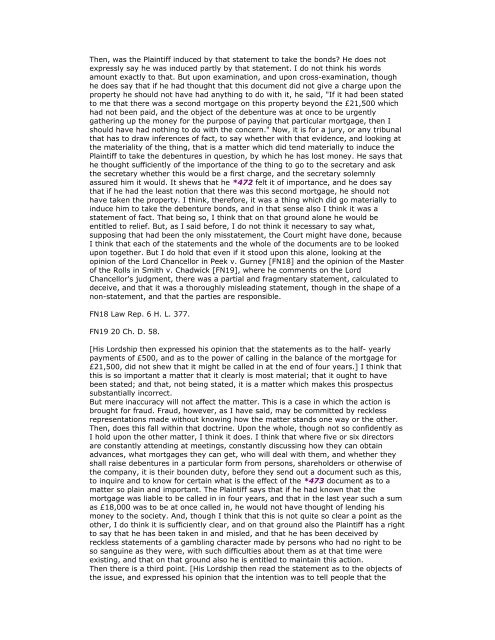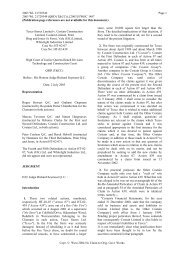Edington v Fitzmaurice - Thomson Reuters
Edington v Fitzmaurice - Thomson Reuters
Edington v Fitzmaurice - Thomson Reuters
You also want an ePaper? Increase the reach of your titles
YUMPU automatically turns print PDFs into web optimized ePapers that Google loves.
Then, was the Plaintiff induced by that statement to take the bonds? He does notexpressly say he was induced partly by that statement. I do not think his wordsamount exactly to that. But upon examination, and upon cross-examination, thoughhe does say that if he had thought that this document did not give a charge upon theproperty he should not have had anything to do with it, he said, "If it had been statedto me that there was a second mortgage on this property beyond the £21,500 whichhad not been paid, and the object of the debenture was at once to be urgentlygathering up the money for the purpose of paying that particular mortgage, then Ishould have had nothing to do with the concern." Now, it is for a jury, or any tribunalthat has to draw inferences of fact, to say whether with that evidence, and looking atthe materiality of the thing, that is a matter which did tend materially to induce thePlaintiff to take the debentures in question, by which he has lost money. He says thathe thought sufficiently of the importance of the thing to go to the secretary and askthe secretary whether this would be a first charge, and the secretary solemnlyassured him it would. It shews that he *472 felt it of importance, and he does saythat if he had the least notion that there was this second mortgage, he should nothave taken the property. I think, therefore, it was a thing which did go materially toinduce him to take the debenture bonds, and in that sense also I think it was astatement of fact. That being so, I think that on that ground alone he would beentitled to relief. But, as I said before, I do not think it necessary to say what,supposing that had been the only misstatement, the Court might have done, becauseI think that each of the statements and the whole of the documents are to be lookedupon together. But I do hold that even if it stood upon this alone, looking at theopinion of the Lord Chancellor in Peek v. Gurney [FN18] and the opinion of the Masterof the Rolls in Smith v. Chadwick [FN19], where he comments on the LordChancellor's judgment, there was a partial and fragmentary statement, calculated todeceive, and that it was a thoroughly misleading statement, though in the shape of anon-statement, and that the parties are responsible.FN18 Law Rep. 6 H. L. 377.FN19 20 Ch. D. 58.[His Lordship then expressed his opinion that the statements as to the half- yearlypayments of £500, and as to the power of calling in the balance of the mortgage for£21,500, did not shew that it might be called in at the end of four years.] I think thatthis is so important a matter that it clearly is most material; that it ought to havebeen stated; and that, not being stated, it is a matter which makes this prospectussubstantially incorrect.But mere inaccuracy will not affect the matter. This is a case in which the action isbrought for fraud. Fraud, however, as I have said, may be committed by recklessrepresentations made without knowing how the matter stands one way or the other.Then, does this fall within that doctrine. Upon the whole, though not so confidently asI hold upon the other matter, I think it does. I think that where five or six directorsare constantly attending at meetings, constantly discussing how they can obtainadvances, what mortgages they can get, who will deal with them, and whether theyshall raise debentures in a particular form from persons, shareholders or otherwise ofthe company, it is their bounden duty, before they send out a document such as this,to inquire and to know for certain what is the effect of the *473 document as to amatter so plain and important. The Plaintiff says that if he had known that themortgage was liable to be called in in four years, and that in the last year such a sumas £18,000 was to be at once called in, he would not have thought of lending hismoney to the society. And, though I think that this is not quite so clear a point as theother, I do think it is sufficiently clear, and on that ground also the Plaintiff has a rightto say that he has been taken in and misled, and that he has been deceived byreckless statements of a gambling character made by persons who had no right to beso sanguine as they were, with such difficulties about them as at that time wereexisting, and that on that ground also he is entitled to maintain this action.Then there is a third point. [His Lordship then read the statement as to the objects ofthe issue, and expressed his opinion that the intention was to tell people that the
















